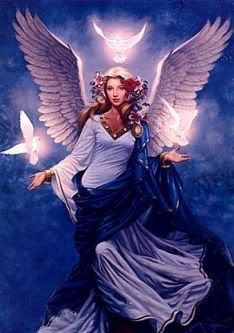Layalat-al-Qadr, also know as "The night of power" is a night of worship worth 83 years and a night when Angels come to Muslims worshiping Allah.
Laylat-al-Qadr is a blessed night of power in Islam. Laylat-al-Qadr shall come on a peaceful and serene evening according to the hadith (the words and deeds of Prophet Mohammad, peace be upon him*). It's said that it will be a night of peace; a night when it is neither cold nor hot; a night when a Muslim's heart will be at peace.
Laylat-al-Qadr falls in the last ten days of Ramadan; it usually falls on an odd day, such as the 21st, 23rd, 25th, 27th or 29th of the month. Though there have been some hadiths that indicate that Layalat-al-Qadr has occurred on even days of the month. Muslims search for Layalat-al-Qadr during the last ten days of Ramadan; during this period, they are prepared for Allah's blessings.
Muslim Belief in Shaking Hands With Angels
When the Muslim is fasting in Ramadan and supplicating to Allah, many forget to ask to have an accepted Layalat-al-Qadr. On an extremely beautiful night — said to be worth 1,000 months of prayers and worship — it's believed that the Angel Gabriel descends with 70,000 angels to shake the hands of the worshiping Muslims.
According to Islamic belief, the word of peace may be said by Angel Gabriel to Allah's servants on that most blessed and sacred night.
The Quran describes the event, saying, "Indeed We sent it [the Holy Quran] down on the Night of Power. What will convey to you what the Night of Power is like! Better is the Night of Power than a thousand months in that Night the angels and the Spirit descend by the permission of their Lord for every affair. Peace it is, till the break of dawn." (Sura Al-Qadr, verses 1-5)
The "spirit" mentioned here refers to the Blessed Angel Gabriel descending on the earth where believing Muslims greet him; he and the angels shake the hands of all devoted servants of Allah. Muslims believe that these last ten days are a good time to perform I'tikaf or Seclusion in the Mosque.
Angel Gabriel and the other 70,000 angels will make Dua (supplication) for all humanity and believing Muslims on this evening. It's believed that there are several signs of a successful "Night of Power" also such as goose bumps on the arms, tears in the eyes when praying and taraweed salat (voluntary prayers performed late at night). Some believers have actually reported a movement in the hands. It's said that a peacefulness or serene feeling in the heart should accompany these feelings also.
Who are the Angels, According to Islam?
Belief in angels is the second pillar of faith in Islam and on the shahadah (declaration of faith in Islam). Not only do Muslims believe in Gabriel, but the Muslims believe in all angels sent from Allah.
According to the Quran, "The Messenger believes in what has been revealed to him from his Lord, and so do the believers. All believe in Allah, His Angels and His Messengers." (Sura Baqarah, verse 285)
Angels are made from light, where the jinn were created from a smokeless fire. To believe and love the Angels is part of the Islamic faith. It's said that Angel Gabriel was the angel who gave the verses of the Quran to Prophet Mohammad, so he is much-loved by all Muslims.
On this topic, the Quran says, "Say: Who is an enemy to Jibreel (Gabriel)? For it is he who brought it (this Quran) down to your hearts, by Allah's permission, confirming that which was before it, and as a guidance and a mercy to the believers. Whoever is an enemy to Allah, and to His Angels, and to His Messengers, and (in particular to) Jibreel and Mika'el (Michael), then let him know that Allah is an enemy to the disbeliever." (Sura Al Baqarah, verses 97-98)
Layalat-Al-Qadr is The Night of Power
Laylat-al-Qadr is a blessed night of power; it's not a night that should be taken lightly or missed. The night arrives unexpectedly, so devout Muslims look for the signs during the last days of Ramadan; many watch the sunrise for confirmation as to whether the night was, indeed, Layalat-al-Qadr.
It's said that on the morning following Layalat-al-Qadr, the sun will be like a flat disk with no rays visible until the sun rises half way in the horizon. Muslims believe that the miracle of Allah will astonish and amaze people who witness the beauty of the horizon alongside the sun's glory. When the signs are observed, devout Muslims rush to prayer and thank Allah for being among those who has witnessed this miracle.
* Muslims invoke Allah's blessings on the Prophet Muhammad whenever this name is mentioned.
Resources:
Muslim Voices
Mission Islam
Photo courtesy of Photobucket: pandabear-4


